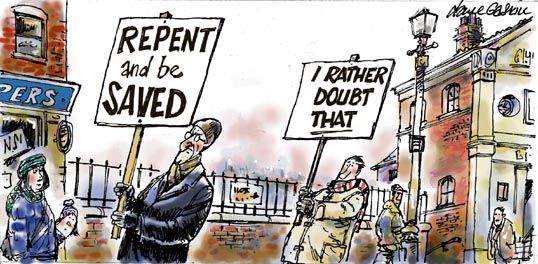
The cartoon accompanying a piece in the Church Times today, on – you guessed it – doubt. A taster:
The Archbishop of Canterbury concurs that it is hard for anyone in public life to admit to doubts. This goes for politicians as much as priests: confess that you are not sure about something, and you leave yourself open to all manner of media attacks. (Conversely, he also notes that whenever someone does try to pin him down on what he believes, he can see in their eyes that what they really want is a tidy certainty to dismiss tidily.)
That said, Dr Williams is not convinced that the pulpit is the best place to rehearse doubts. Rather, it is the place to set out the richness of the tradition, and then, equipped with those resources, the individual can explore difficult questions in a more pastoral setting. “What you need is a stable environment of wor-ship, imagery, prayer, and imagination,” he suggests.
The mistake is to assume that the Bible or particular doctrines deliver certainties of themselves. Rather, they are collections of imaginative stories, and assemblies of intellectual scaffolding. Equipped with them, a person can discern the mystery of God. What they offer is like a window that opens on to another way of looking at the world, or, to switch metaphors, a mirror that reflects the world in a different light.